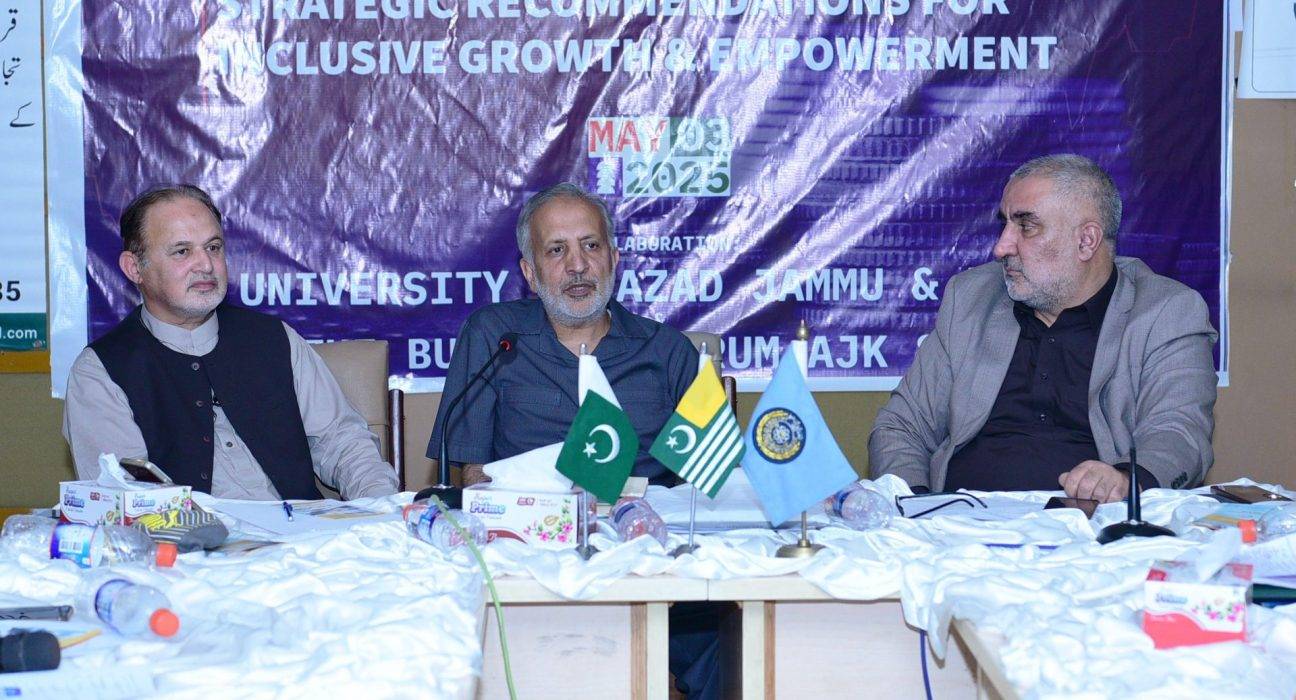A high-level pre-budget seminar co-hosted by the University of Azad Jammu and Kashmir (UAJK) and the Business Forum of Azad Jammu and Kashmir & Gilgit-Baltistan called for a paradigm shift in the region’s fiscal strategy, urging authorities to move beyond traditional budget formats and prioritize development sectors that directly enhance the income and quality of life of ordinary citizens.
Held at UAJK’s City Campus, the seminar drew participation from economists, business leaders, civil society activists, university scholars, and media professionals. The central message was clear: sustainable economic progress in Azad Jammu and Kashmir requires a people-centric approach that reflects the realities on the ground rather than adhering solely to conventional income-expense models.
UAJK Vice Chancellor Prof Dr Nadeem Haider Bukhari, in his keynote address, commended the Business Forum for fostering a culture of participatory dialogue in the budget-making process. “A national budget must be more than just a financial document. It should echo the aspirations and challenges of its people,” he said. Stressing the financial struggles of public universities in the region, he called on the government to allocate greater resources to higher education in the 2025–26 fiscal plan and to formally incorporate academic proposals into the final budget.
Sardar Imran Aziz, President of the Business Forum AJK & GB, noted that the Forum is conducting similar consultations across all districts of AJK and Gilgit-Baltistan. He emphasized the importance of integrating feedback from media, civil society, and the business community to build a budget that genuinely responds to local needs.
Syeda Asma Andrabi, Prime Minister’s Coordinator for the UN Sustainable Development Goals, spoke about a $600 million collaborative project between the AJK government and UNICEF. The initiative aims to enhance capacity building, service delivery, and digital governance in six major departments. She urged a shift from federal dependency towards localized strategies to combat issues like food insecurity, environmental degradation, and inadequate waste management. Andrabi also encouraged universities to contribute by training government personnel in line with the SDG targets.
Former government secretary Khawaja Ahsan lauded the initiative as a step toward more transparent and effective governance. He reiterated the importance of public involvement in fiscal planning for achieving long-term economic stability.
Prof. Dr Samina Sabir, Director of the Kashmir Institute of Economics, stressed the need for budgetary allocations dedicated to digitizing government operations. She highlighted the lack of reliable economic data as a major barrier to sound policy-making and equitable resource distribution.
Faculty members Dr Wajid Aziz Lone and Dr Atiq ur Rehman proposed greater engagement with public representatives in the budget-drafting process. They advocated reduced reliance on the State Bank and called for investment in hydro energy, tourism, and IT-based human capital to establish self-sustaining revenue streams.
Journalists Imtiaz Awan and Basharat Mughal underlined the critical role of rural development in the region’s progress, pointing out that over 83 percent of AJK’s population resides in rural areas. They recommended a budgetary focus on rural service delivery, youth skill development, and environmental protection to alleviate urban strain and foster inclusive growth.
Business and civil society representatives including Shaukat Nawaz Mir, Faisal Jameel Kashmiri, Shahid Awan, Muhammad Nadeem, Muhammad Ehtesham, and scholar Syed Ali Abidi Hamdani, proposed harnessing the region’s natural herb and mineral resources through transparent frameworks. They also pushed for streamlined NOC procedures to attract foreign tourists and invigorate the local economy.
Concluding the seminar, Business Forum Secretary General Kashif Jameel noted the rising community interest in micro-enterprises like agriculture, horticulture, and apiculture. He described these initiatives as critical steps toward strengthening local livelihoods and building economic resilience at the grassroots level.
The seminar underscored a shared commitment across academia, civil society, and business circles to reshape AJK’s financial future through inclusive, data-driven, and people-focused budget planning.



